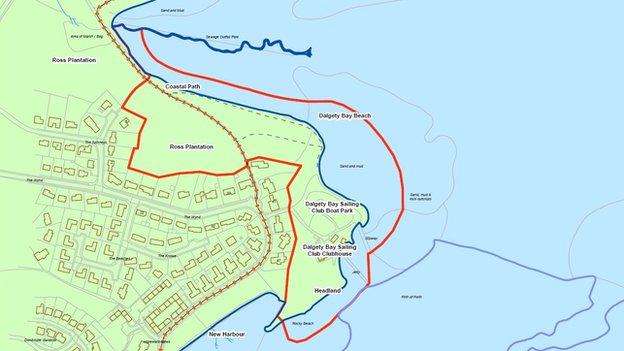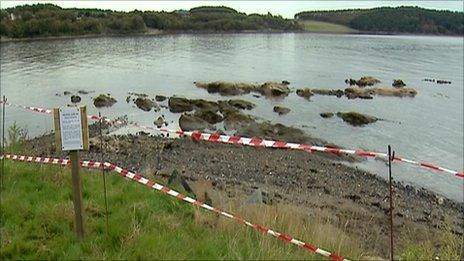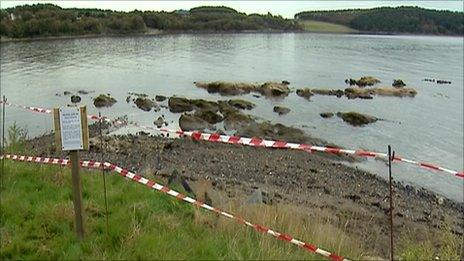Dalgety Bay radiation: Report criticises lack of records of contaminated land
- Published

The red line shows the site boundary of the affected area at Dalgety Bay
It is unacceptable that the UK does not have comprehensive records of land potentially contaminated with radiation, a report has said.
It said the failure meant such sites pose an unknown risk to the population.
The Committee on Medical Aspects of Radiation in the Environment (Comare) investigated radium contamination at Dalgety Bay in Fife.
Members said the Scottish government should consider building an offshore barrier on the affected coastline.
The source of the radiation at Dalgety Bay is thought to be luminous instrument dials from aircraft which were buried in the area after the Second World War.
The instrument dials on the aircraft had been illuminated by paint containing radium-226.
The planes were stationed at the nearby HMS Merlin airfield, which was commissioned in 1939 as a Royal Naval Aircraft Repair Yard and decommissioned in 1959 before being sold off in the 1960s.
In its report, external, Comare said contamination at the beach in Fife posed a potential risk to public health and could get worse unless action was taken.
In addition to the option of an offshore barrier, the report recommended that children should not dig on the beach, additional warnings should be posted at the site and further research should be carried out into the effect of the contamination.
The report said a lack of records of the amount of radioactive material brought onto the site meant that it was not possible "to determine the radioactivity remaining or to estimate the longevity or magnitude of the associated hazard".
The committee said it was "unlikely that there is a current significant risk posed by airborne contamination" but that more work was needed to determine the risk posed by skin contact, particularly for young children.
'Long term solution'
Representatives of the Scottish Environmental Protection Agency (Sepa), Public Health England and the UK Ministry of Defence (MoD) have observer status at Comare meetings.

The report investigated radium contamination at Dalgety Bay
An MoD spokesman said: "The advice from Public Health England, formerly the Health Protection Agency, has consistently been and following consideration of this report, continues to be, that the risk to the local community at Dalgety Bay from the presence of radium is very low.
"The government is committed to ensuring that those living locally continue to receive the best possible advice which is why we have worked closely with COMARE to ensure the report's findings are based on the most comprehensive and up-to-date information available.
"Over the last two decades the MoD has worked closely with Sepa, the Scottish government and the Dalgety Bay Forum to manage the site so that the local community can continue to safely use the bay.
"A report setting out remediation options was published earlier this year and next month the MoD will publish a long term solution for the bay, setting out how all parties can best manage the site in the future."
'Lack of transparency'
The Scottish government criticised the MoD for allegedly delaying publication of the report.
Scotland's Public Health Minister, Michael Matheson, claimed the delay represented "a lack of transparency on behalf of the MoD and suggests a disregard for the concerns of the local community at Dalgety Bay".
He added: "The report confirms that it is very unlikely that there is a link between elevated rates of particular cancers at Dalgety Bay and the radioactive contamination.
"This is welcome, and I hope it offers some measure of reassurance to the community of Dalgety Bay.
"Nonetheless, the report does conclude that the contamination poses a public health risk, particularly through possible skin contact and ingestion.
"While the warning signs and access restrictions applied at the beach should minimise these risks, these measures cannot be permanent."
He added: "The report makes a number of important recommendations about managing this in the long term, including that effective remediation of the affected area is undertaken as soon as possible.
"Sepa have been working with the MoD on the development of remediation options, even while the report remained unpublished, and so I am expecting the MoD to start to implement a long term solution shortly."
- Published14 May 2014

- Published7 February 2014

- Published22 January 2014

- Published28 June 2013

- Published6 March 2013

- Published29 October 2012

- Published16 October 2012
